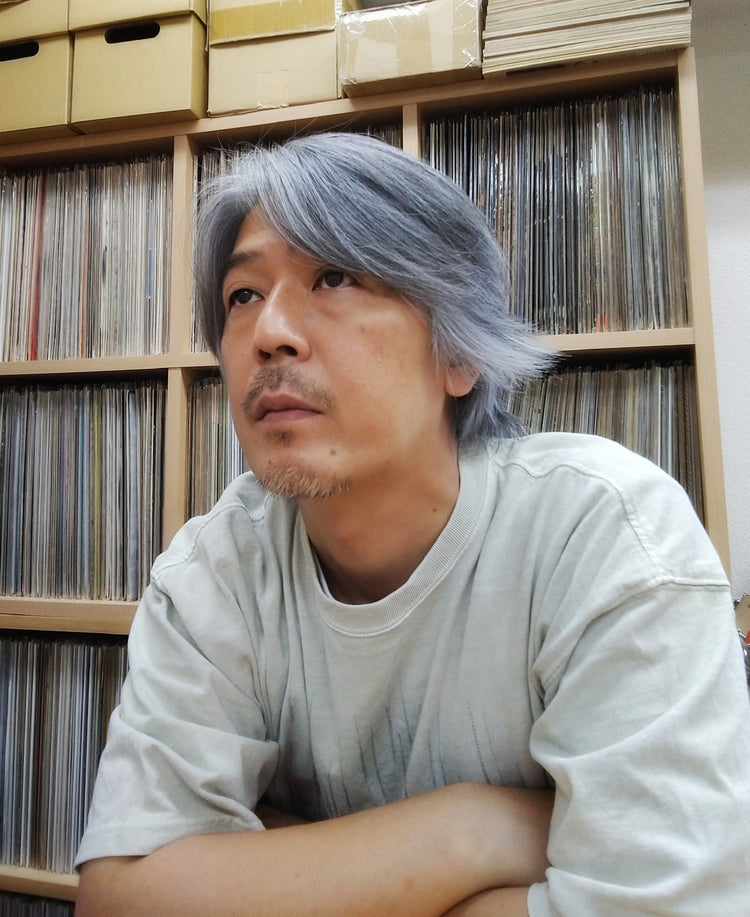
You may not be familiar with the name Yusuke Ogawa, but if you’re reading this you are likely very familiar with his work. He runs the Universounds record store in Tokyo as well as being a legendary curator of Japanese Jazz; specifically two of our favorite collections: the Deep Jazz Reality / Project Re:Vinyl reissue series and the WaJazz compilations. And he also curated used LPs for us as well!
While Yusuke doesn’t play an instrument, his work has contributed to the spread of Japanese Jazz across the globe and helped many people discover Japanese artists and LPs. He graciously shared lots of information about Japanese Jazz, answered questions from our Instagram followers, and even our silly questions. We’ve made minor edits for clarity / readability and added links.
Cromulent Records: Tell us about yourself and how you got into Jazz... Where did you grow up? Did you play an instrument? When did you start collecting LPs?
Yusuke Ogawa: I was born and grew up in Sapporo, a city at north part of Japan. I came to Tokyo when I was 20 to enter university. It was the early 90’s and I started collecting records at the time. At first, I was interested in rare groove, but from there my personal interest expanded into broader jazz. I don't play any instrument, just listen to music :)
CR: Growing up in Sapporo, did you go to Ryo Fukui's Slowboat Jazz Club? Did you see see him play there?
YO: I haven’t visited the Slowboat yet but I saw Ryo Fukui's live a few years before he died. It was really great. Also, I inteviwed Ryo Fukui and his wife Yasuko Fukui several times. I wrote a part of them in the linernotes of Ryo Fukui's LP reissues. (CR Note: This is another great reason to invest in the Project Re:Vinyl Rio Fukui pressings!)
CR: What separates Japanese Jazz from other types of Jazz?
YO: The characteristic of Japanese jazz is, first of all, that it is the music of the era / period. The word "WaJazz" is a combination of "Wa" which means Japan, and "Wa" in Showa era. The term is from the 1950s to the 1980s. This coincides with a period of rapid change and growth in Japan, both culturally and economically. I think that this historical background also influences the music.
In addition, mixture with Japanese traditional music, reflection of idea of Yaoyorozu No Kami (an ancient Japanese way of thinking that feels God in all things), expression of wabi-sabi (subtle aesthetics and sensibilities peculiar to Japan and) or Ma (space or timing), delicate and detailed depiction of inner mind and nature, such very Japanese things are featured in Japanese jazz.
CR: When did you open Universounds?
YO: It was December 2001.
CR: What is the difference between Project Re:Vinyl and Deep Jazz Reality?
YO: Deep Jazz Reality is my personal label / reissue series and Project Re:Vinyl is collaboration HMV and Deep Jazz Reality.
CR: How did the Project Re: Vinyl reissue series come about? How do you identify LPs to include in the series?
YO: I got an offer from HMV record shop to start new reissue series with them. I was very happy because I wanted to reissue Japanese jazz LPs at that time and HMV was very enthusiastic about Japanese jazz. Also, they have solid know-how.
I identify LPs to reissue (using the following criteria):
- The music is great
- The LPs that I want to people to listen to
- The ones that seem many people want to listen to on vinyl
- Difficult to find / purchase original pressings
CR: Since you work with HMV/Lawson, what do you like to get at Lawson stores?
YO: Lol. Coffee and donut.
CR: How did the WaJazz compilation happen? When you’re creating a compilation, do you check / listen to other Jazz compilations to make sure you're including different songs?
YO: The first time 180g contacted me was in March 2019. Max from 180g came to Japan and visited my shop. Max knew about my reissue works and told me that he would like to collaborate with me at 180g. And in May 2020 he gave me an offer to produce a Japanese jazz compilation.
I didn't check another compilations. It's been a while since Japanese jazz came to be recognized worldwide. There are many tunes that are widely known. Some of those tunes must be included to introduce charm of Japanese jazz. And I also wanted to include songs that provide an opportunity to learn more and more about Japanese jazz. The important thing for me was what should I put in the compilation to introduce Japanese jazz worldwide, even if some tunes are included on another compilation.
CR: What are some of your favorite non-Jazz artists / LPs?
YO: I like soul / funk music too, and been collecting 45s for years. My favorite soul / funk LP is James Knight and the Butlers "Black Knight”. (CR Note: Yusuke prompted us to stock this LP and it doesn't disappoint - check it out!)
CR: Do people get the Japanese Village Vanguard (chain store) and NYC Village Vanguard mixed up?
YO: Lol. No I don't think so.
CR: Here are a few questions from our Instagram followers about represses; will there be a repress of:
Toshiyuki Miyama & The New Herd - Nio and Pigeon?
YO: Someday, I hope.
Himiko Kukuchi - Flying Beagle?
YO: No, not at the moment.
Kugishi Sugimoto Quintet - Babylonia Wind?
YO: Someday, I hope.
Thanks for reading and a BIG thank you to Yusuke for taking the time to chat with us!
